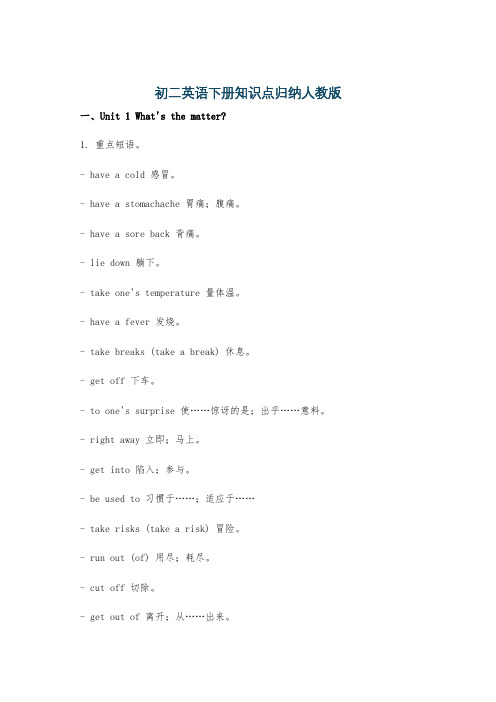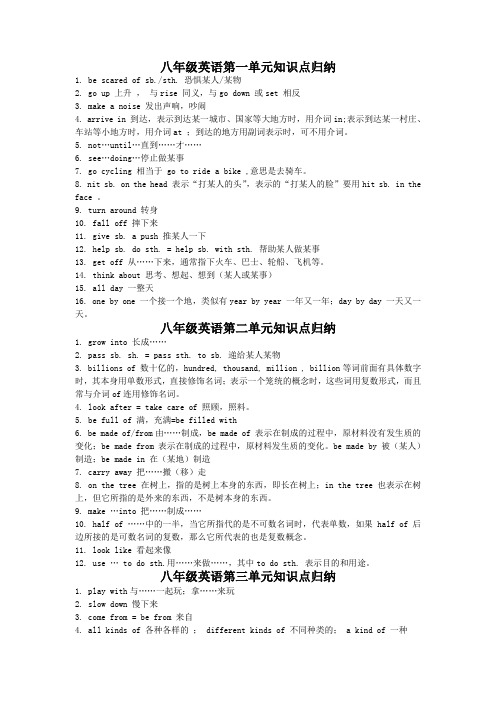最新人教版英语八年级下册知识点总结(精华版)
初二英语下册知识点归纳人教版

初二英语下册知识点归纳人教版一、Unit 1 What's the matter?1. 重点短语。
- have a cold 感冒。
- have a stomachache 胃痛;腹痛。
- have a sore back 背痛。
- lie down 躺下。
- take one's temperature 量体温。
- have a fever 发烧。
- take breaks (take a break) 休息。
- get off 下车。
- to one's surprise 使……惊讶的是;出乎……意料。
- right away 立即;马上。
- get into 陷入;参与。
- be used to 习惯于……;适应于……- take risks (take a risk) 冒险。
- run out (of) 用尽;耗尽。
- cut off 切除。
- get out of 离开;从……出来。
- be in control of 掌管;管理。
2. 重点句型。
- What's the matter? = What's wrong? = What's the trouble? 怎么了?- Should I put some medicine on it? 我应该在它(伤口)上敷些药吗?- You should lie down and rest. 你应该躺下休息。
- He hurt himself in P.E. class. 他在体育课上伤到了自己。
- Aron Ralston is an American man who is interested in mountain climbing. 阿伦·罗尔斯顿是一个对登山感兴趣的美国人。
3. 语法。
- 情态动词should的用法:should表示“应该”,用来提出建议或劝告,后接动词原形。
例如:You should see a dentist. 否定形式为shouldn't,例如:You shouldn't go to school late.二、Unit 2 I'll help to clean up the city parks.1. 重点短语。
最全面人教版八年级下册英语第一单元知识点归纳总结

Unit 1 What's the matter?一、词汇与短语◆重点单词A部分1.matter n. 问题;事情2.sore adj. 疼痛的;酸痛的3.stomachache n. 胃痛;腹痛4.foot n. 脚;足5.neck n. 颈;脖子6.stomach n. 胃;腹部7.throat n. 咽喉;喉咙8.hurt v. (使)疼痛;受伤9.fever n. 发烧10.passenger n. 乘客;旅客11.lie v. 躺;平躺12.break n. 间歇;休息13.rest v. &n. 放松;休息14.onto prep. 向;朝15.X-ray n. X射线;X光16.trouble n. 问题;苦恼17.toothache n. 牙痛18.hit n. (用手或器具)击;打19.headache n. 头痛20.herself pron. (she的反身代词)她自己21.off adv. & prep. 离开(某处);不工作;从……去掉B部分1.bandage n. 绷带v. 用绷带包扎2.press v. 压;挤;按3.sick adj. 生病的;有病的4.knee n. 膝;膝盖5.breathe v. 呼吸6.knife n. 刀7.sunburned adj. 晒伤的8.blood n. 血9.ourselves pron. (we反身代词)我们自己10.mean v. 意思是;打算11.climber n. 登山者;攀登者12.importance n. 重要性;重要13.risk n.&v. 危险;风险;冒险14.decision n. 决定;抉择15.accident n.(交通)事故;意外遭遇16.control v.&n. 限制;约束;管理17.situation n. 情况;状况18.spirit n. 勇气;意志19.kilo( = kilogram) n. 千克;公斤20.death n. 死;死亡21.rock n. 岩石22.nurse n. 护士◆重点短语A部分1.have a cold 感冒2.lie down 躺下3.have a stomachache 胃痛4.take one's temperature 量体温5.have a fever 发烧6.to one's surprise 使……惊讶的是7.get off 下车8.right away 立即;马上9.take breaks (take a break) 休息10.talk too much 说得太多11.drink enough water 喝足够的水12.have a very sore throat 嗓子非常疼13.get an X-ray 拍X光片14.see a dentist 看牙医15.drink some hot tea with honey 喝一些加蜂蜜的热茶16.put some medicine on sth.在……上面敷一些药17.feel very hot 感到很热18.sound like 听起来像19.all weekend 整个周末20.in the same way 以同样的方式21.go to a doctor 看医生22.go along 沿着……走23.on the side of the road 在马路边24.shout for help 大声呼救25.without thinking twice 没有多想26.have a heart problem 有心脏病27.thanks to 多亏了;由于28.in time 及时29.save a life 挽救生命30.get into trouble 陷入麻烦31.hurt oneself 受伤32.fall down落下;摔倒B部分1.be used to 习惯于……;适应于……2.in a difficult situation 在困境中3.take risks (take a risk) 冒险4.keep on doing sth. 继续(或坚持)做某事5.run out (of) 用尽;耗尽6.make a decision 作出决定7.cut off 切除8.get hit on the head 撞到头部9.get out of 离开;从……岀来10.be interested in 对……感兴趣11.give up 放弃12.mean doing sth. 意味着做某事13.put a bandage on sth. 用绷带包扎…14.lose one's life 失去生命15.feel sick 感到恶心16.mountain climbing 登山运动17.have problems breathing 呼吸困难18.be in control of 掌管;管理◆重点句子A部分1.What's the matter with you?=What's the trouble with you?=What's wrong with you?你怎么了?2.What should she do? 她该怎么办呢?3.Did you fall down? 你跌倒了吗?4.Should I take my temperature? 我应该量一下体温吗?5.I think I sat in the same way for too long without moving.我想我以同样的姿势一动不动地坐得太久了。
最新人教版八年级英语下册第一单元知识点汇总

最新人教版八年级英语下册第一单元知识点汇总Unit 1 What’s the matter?一、基础知识1.我感冒了。
可以表达为I had a cold、catch a cold或have the flu。
have a fever表示发烧,have a cough表示咳嗽,have a stomachache或肚子疼表示胃疼,have a toothache表示牙疼,have a headache表示头疼。
2.将身体部位和ache(疼痛)结合起来构成新的复合词,如stomach+ache=stomachache,head+ache=headache,tooth+ache=toothache,back+ache=backache,表示相应的疼痛。
3.“怎么啦?出什么事情了?”可以表达为What’ s the matter。
也可以用What’ s the trouble with you?或What’ s wrong with you。
matter和trouble为名词,其前可加the或形容词性物主代词,而wrong是形容词不能加the。
用于询问某人有什么病或遇到什么麻烦、问题,其后跟询问对象时,与介词with连用,如What’s the matter with sb。
= What’s your trouble?= What’s up?= What happens to sb。
举例来说,当问到“What’s the matter with you?”时,回答可以是“I have a bad cold.”4.maybe表示“或许”,常用于句首,表示可能性,后加句子。
例如Maybe you are right。
may be是情态动词+be的结构,意为“可能,也许”,后加名词、代词或形容词。
例如He maybe angry。
sound like可以和名词、代词以及从句结合使用,如It sounds like you don’t know the truth.It sounds like a good idea。
(完整版)最新人教版八年级下册英语全册知识点大全

最新人教版八年级下册英语全册知识点大全Unit 1重点短语:have a stomachache have a cold lie downtake one’s temperature have a fever go to a doctorto one’s surprise agree to (do sth.)get into troublebe used to take risks run out (of)cut off get out of be in control ofkeep on ( doing sth.)give up语言知识归纳:1. What’s the matter (w ith you)?此句用来询问别人的病情。
类似的句子还有:What’s wrong with you?/ What’s the trouble?matter作动词用,意为“要紧”“有关系”,主要用于疑问句和否定句。
What does it matter? It doesn’t matter.【例题】Does it ________ if we can’t finish it today?A. mindB. mindsC. matterD. matters2. I have a sore throat.have “患病”,常用“have a /an+ 名词”.have a cold have a fever have a sore backhave a stomachache have a cough【例题】( )---Does he often have ______ cold? ---Yes. He also _____a cough and a sore throat.A. a; hasB. /; hasC. a; haveD. /; have3.Lie down and rest! 躺下休息lie down 躺下4.That’s probably why. 那可能就是原因。
人教版八年级英语下册各知识点归纳总结(最新最全)

人教版八年级英语下册各知识点归纳总结Unti1 what’s the matter?短语归纳1.too much 太多2.lie down 躺下3.get an X-ray 做个X光检查4.take one ’s temperature 量体温5.put some medicine on ......在....上敷药6.have a fever 发烧7.take breaks /take a break 休息 8.without thinking twice 没多想9.get off 下车 10.take sb to the hospital 送某人去医院11.wait for等待 12.to one’s surprise 使.......惊讶的13.thanks to多亏于;由于 14.in time及时15.think about 考虑 16.have a heart problem患有心脏病用法归纳1.need to do sth .需要去做某事2.see sb doing sth 看见某人正在做某事3.ask sb sth 询问某人某事4.expect sb to do sth 期望某人做某事5.agree to do sth 同意做某事6.help sb (to) do sth 帮助某人做某事7.want to do sth 想要做某事 8.tell sb to do sth 告诉某人做某事9.have problems(in) doing sth 做某事有困难 e sth to do sth用某物去做某事语法点1.询问某人的健康问题及遇到麻烦的表达方法2.情态动词should的用法3.不定代词的用法精细解读1. What’s the matter (with you)? 怎么了?出什么事了?What’s the trouble/ the problem / wrong with sb./ sth.?2. I had a cold.我感冒了。
人教版八年级英语下册各单元知识点总结完整版

Unit 1 What’s the matter?一、重点短语1. have a fever 发烧2. have a cough 咳嗽3. have a toothache 牙疼4. talk too much 说得太多5. drink enough water 喝足够的水6. have a cold 受凉;感冒7. have a stomachache 胃疼8. have a sore back 背疼9. have a sore throat 喉咙痛10. lie down and rest躺下来休息11. hot tea with honey加蜂蜜的热茶12. see a dentist看牙医13. get an X-ray拍X光片14. take one’ s temperature量体温15. put some medicine on sth在……上面敷药16. feel very hot 感到很热17. sound like 听起来像18. all weekend 整个周末19. in the same way以同样的方式20. go to a doctor 看医生21. go along 沿着……走22. on the side of the road 在马路边23. shout for help 大声呼救24. without thinking twice 没有多想25. get off 下车26. have a heart problem 有心脏病27. to one’ s surprise 使……惊讶的28. thanks to 多亏了;由于29. in time及时30. save a life 挽救生命31. get into trouble 造成麻烦32. right away 立刻;马上33. because of 由于34. get out of 离开35. hurt oneself 受伤36. put a bandage on sth. 用绷带包扎37. fall down 摔倒38. feel sick 感到恶心39. have a nosebleed 流鼻血40. cut his knee割伤他的膝盖41. put her head back 把她的头向后仰42.have problems breathing呼吸困难43. mountain climbing登山运动44. be used to doing sth. 习惯做某事45. run out (of) 用完;用尽46. so that 以便47. so…that 如此……以至于……48. be in control of 掌管;管理49. in a difficult situation 在逆境屮50. keep on doing sth.坚持做某事51. make a decision做出决定52. take risks 冒险53. give up 放弃二、知识点解析1. What’s the matter? 怎么了?若是询问“某人怎么了?”要用“What’s the matter with sb.?”拓展:What’s the matter with sb.? 的同义句:What’s wrong with sb.? / What’s the trouble with sb.?2.疾病类短语:have a +疾病. e.g. :have a fever 发烧have a cold 感冒have a cough 咳嗽.have a +身体部位-ache. e.g.: have a headache 头痛have a toothache 牙痛.have a sore+身体部位. e.g.: have a sore throat咽喉痛have a sore back背痛例题:Mom, I____________.I’m sorry to hear that, dear. We must go to see the dentist right away.A. have a headacheB. have a stomachacheC. have a toothacheD. have a fever3. lie down 躺下V. 躺,平躺。
人教版八年级下册英语知识点总结(最新最全)

八年级英语第一单元知识点归纳1. be scared of sb./sth. 恐惧某人/某物2. go up 上升,与rise 同义,与go down 或set 相反3. make a noise 发出声响,吵闹4. arrive in 到达,表示到达某一城市、国家等大地方时,用介词in;表示到达某一村庄、车站等小地方时,用介词at ;到达的地方用副词表示时,可不用介词。
5. not…until…直到……才……6. see…doing…停止做某事7. go cycling 相当于 go to ride a bike ,意思是去骑车。
8. nit sb. on the head 表示“打某人的头”,表示的“打某人的脸”要用hit sb. in the face 。
9. turn around 转身10. fall off 摔下来11. give sb. a push 推某人一下12. help sb. do sth. = help sb. with sth. 帮助某人做某事13. get off 从……下来,通常指下火车、巴士、轮船、飞机等。
14. think about 思考、想起、想到(某人或某事)15. all day 一整天16. one by one 一个接一个地,类似有year by year 一年又一年;day by day 一天又一天。
八年级英语第二单元知识点归纳1. grow into 长成……2. pass sb. sh. = pass sth. to sb. 递给某人某物3. billions of 数十亿的,hundred, thousand, million , billion等词前面有具体数字时,其本身用单数形式,直接修饰名词;表示一个笼统的概念时,这些词用复数形式,而且常与介词of连用修饰名词。
4. look after = take care of 照顾,照料。
5. be full of 满,充满=be filled with6. be made of/from由……制成,be made of 表示在制成的过程中,原材料没有发生质的变化;be made from 表示在制成的过程中,原材料发生质的变化。
人教版英语八年级下册知识点总结

人教版英语八年级下册知识点总结一、语法知识点1. 时态:掌握一般现在时、一般过去时、一般将来时、现在进行时、过去进行时、过去将来时等时态的用法。
2. 过去进行时:用于表示过去某一时间正在进行的动作或状态。
3. 以下代词和副词的用法:- somebody, anybody, nobody, everybody 可用作主语或宾语。
- something, anything, nothing, everything 可用作主语或宾语。
- somewhere, anywhere, nowhere, everywhere 可用作地点副词。
4. 句型:掌握各种基本句型,如祈使句、选择疑问句、反义疑问句等。
5. 状语从句:掌握时间、原因、结果、条件等类型的状语从句的用法,并注意从句的引导词。
6. 定语从句:研究使用关系代词 who, whom, whose, which, that 引导定语从句,并了解先行词和关系词在从句中的作用关系。
二、词汇知识点1. 词汇拼写和用法:巩固和扩大基础词汇量,掌握词汇的正确拼写和用法。
2. 同义词和反义词:研究常用的同义词和反义词,提高词汇表达的能力。
3. 词组和固定搭配:掌握常用的词组和固定搭配,能够灵活运用。
三、阅读知识点1. 阅读理解:提高阅读理解能力,掌握快速获取信息的技巧。
2. 阅读策略:研究使用各种阅读策略,如扫读、略读、详读、推断等。
3. 阅读技巧:培养良好的阅读惯和技巧,如划重点、标记陌生单词等。
四、写作知识点1. 写作结构和组织:研究写作时合理安排文章结构和组织思路,使内容连贯。
2. 信息衔接和过渡:掌握信息衔接和过渡的方法,使文章各部分之间有逻辑性。
3. 词汇和句型运用:运用丰富的词汇和多样的句型,提高写作表达的准确性和流畅性。
以上为人教版英语八年级下册的主要知识点总结,希望能帮到你!。
- 1、下载文档前请自行甄别文档内容的完整性,平台不提供额外的编辑、内容补充、找答案等附加服务。
- 2、"仅部分预览"的文档,不可在线预览部分如存在完整性等问题,可反馈申请退款(可完整预览的文档不适用该条件!)。
- 3、如文档侵犯您的权益,请联系客服反馈,我们会尽快为您处理(人工客服工作时间:9:00-18:30)。
最新人教版英语八年级下册知识点总结(精华版)作者:邓华U nit1 W hat’s the matter?一.重点短语1. have a cold感冒2. have a stomachache胃疼3. have a sore back背疼4. have a sore throat喉咙疼5. have a fever发烧6. lie down and(have a) rest躺下休息7.have a rest休息8. hot tea with honey加蜂蜜的热茶9.drink lots of water多喝水10.see a dentist看牙医see a doctor看医生11.lots of ,a lot of, 许多。
大量a lota lot of=lots of,可以修饰可数名词复数和不可数名词,一般用在肯定句中:T here are lots of(a lot of)books in our library.T here is a lot of water on the grounda lot,是一个副词词组,跟动词连用;表示十分,很等意思;T hanks a lot.12. have a toothache牙疼13. T hat’s a good idea好主意14. go to bed去睡觉go to bed early早上床睡觉15. feel well感到好feel ill感到不舒服I don’t feel well= I’m not feeling well我感觉不舒服.16. start doing/ to do sth开始做某事to do是一件事情完成了,开始做另外一件事情doing是原来的那件事情做到一半,现在又开始做了,是同一件事情。
17. two days ago两天前18. get some rest多休息, 休息一会儿19. I think so我认为是这样20. be thirsty口渴21. be hungry饥饿22. be stressed out紧张23. listen to music听音乐24. healthy lifestyle健康的生活方式25. traditional C hinese doctors传统中医26.need to do sth需要做某事I have a toothache. I need to see a dentist. 我牙痛, 我需要去看牙医.W e need to keep our classroom clean. 我们需要保持教室的干净. 27.too much+ 不可数名词太多的…much too+形/副实在太…极其,非常too many+ 可数名词复数太多的…28 .be good for sth./ doing sth. 对什么有益,对什么有好处be bad for sth./ doing sth. 对什么有害be good to对…好be good at=do well in在……方面好,擅长be good(bad) for、be good at的相关用法1). be good for对......有益D oing morning exercises is good for your health.做早操对你们的建康有益。
2). be good at擅长于......L i P ing is good at basketball.李平擅长于篮球。
= L i P ing is good at playing basketball.李平擅长于打篮球。
be good at= do well in如:I'm good at math. = I do well in math.我擅长于数学。
3). be good to对......好P arents are always good to their children.父母亲总是对他们的孩子好。
29.get good grades取得好成绩30.angry用法be angry with sb生某人的气I was angry with him for keeping me waiting .我对他很生气,因为他让我等了好久。
be angry at/ about sth就某事生气31.I t’s easy to do sth做某事是容易的。
I t’s important to do sth. 做某事很重要。
32.balanced diet平衡饮食33.get tired感到疲倦be/get tired34.stay healthy保持健康=keep healthy=keep in good health35.H e shouldn’t eat anything=H e should eat nothing. 他不应当吃任何东西.36.give sb some advice给某人建议give advice提出建议advice是不可数名词a piece of advice一则建议take one’s advice采纳或听从某人的建议H e gave me some good advice .他向我提了一些很好的意见。
49.sleep8 hours a night每晚睡眠八小时,get enough sleep得到充足的睡眠50.take medicine吃药服药I have to take medicine three times a day for my cold.因为感冒,我不得不一天吃三次药二.固定结构I t’s+形容词+ for sb. + to do sth. 做某事对某人来说是…的。
I t’s important for me to eat a balanced diet. 平衡饮食对我来说是很重要的.I t’s easy for us to find out the answer. 找出答案对我们来说是容易的I t’s important/easy to do sth.做某事很重要/容易。
三.重点句子1.W hat’s the matter? W hat’s the matter with you? 你怎么啦?=W hat’s the trouble with you?=W hat’s wrong with you?I have a cold/ have a sore back/ have a stomachache2.T hat’s too bad. Y ou should/ shouldn’t…那太糟糕了. 你应该/不该…Y ou should lie down and rest/ drink hot tea with honey/ see adentist/ see a doctor.H e shouldn’t eat anything= H e should eat nothing. 他不应当吃任何东西.3. I’m not feeling well. 这里well表示身体状况,不能用good代替I don’t feel well= I’m not feeling well我感觉不舒服.4.W hen did it start? A bout two days ago. 什么时候开始的?大约两天前5.I hope you feel better soon.我希望你很快好起来。
(这里better是well的比较级)10.I t’s easy to have a healthy lifestyle,and it’s important to eat a balanced diet.有一个健康的生活方式很容易,饮食平衡是很重要的。
四.语法要点:反身代词以及提建议的情态动词的用法1.情态动词should的用法should是情态动词,它的基本用法是必须和其他动词一起构成谓语。
情态动词没有人称和数的变化,意为"应该......"。
should(应当,应该)用于所有人称,表示劝告或建议。
eg. Y ou should wait a little more.你应该再多等一会儿。
Y ou shouldn`t eat so much next time.你下次不应该吃这么多。
2.反身代词: myself, yourself, himself, herself, itself, ourselves,yourselves, themselves,1). H e hurt himself in PE class. (作宾语)2). J ust be yourself.(作表语)3).T he headmaster himself met me.(作主语同位语)4).Y ou should ask the doctor himself. (作宾语同位语)3.maybe与may be1). maybe是副词,译为“也许、可能”,相当于“perhaps”。
如:M aybe he can answer the question.也许他能回答那个问题。
H e maybe is from the USA, too. 他可能也来自美国。
2). may be中的may为情态动词,译为“可能是......”。
如:H e may be from the USA, too.他可能也来自美国。
S he may be our E nglish teacher. 她可能是我们的英语老师4. few、a few、little、a little的区别和联系:1). few/ a few用来修饰可数名词,few表示否定意义,没有,几乎没有;a few表示有肯定意思,有几个。
例如:H e has few friends here, he feels lonely. 他这里没朋友,他感觉寂寞。
There are a few eggs in the basket.篮子里有几个鸡蛋。
2). little/ a little用来修饰不可数名词,little表示否定意思,没有,几乎没有。
a little 表示肯定意思,有一点儿。
例如:T here is little ink in my bottle, can you give me a little ink?我的瓶子里没有墨水了,你能给我点儿墨水吗?5. not…until直到…(否定句) 才,动词为短暂性或瞬间性动词S he didn’t leave until we came.H e went shopping after he got up. = H e didn’t go shopping until/before he got up . 6.……until/till直到···(肯定句)动词为延续性动词W e stayed here till/ until12 o’clock.U nit 2 I'll help clean the city parks.一.重点短语:1.cheer (sb.) up使(某人)高兴、振作如:cheer me up使我高兴2.clean up打扫clean-up n. 打扫3. volunteer to do v. 自愿做某事4. come up with提出想出== think up想出5. catch up with赶上追上6. put off doing推迟做某事7. put on穿上(指过程)8. put up张贴9. call up打电话make a telephone call打电话10. write down写下记下11. set up成立建立12. put…to use把… 投入使用,利用13. help sb. (to) do帮助某人做某事help sb. with sth. 帮助某人做某事14. plan to do计划做某事plan + 从句I plan to go to B eijing. == I plan (that) I will go to B eijing. 我计划去北京。
